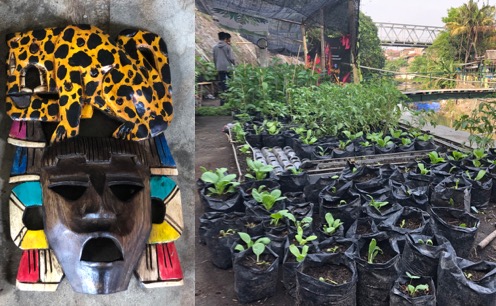Celebrating the work of the Society of Ethnobiology's Graduate Fellowship Winners
Celebrating the work of the Society of Ethnobiology's Graduate Fellowship Winners
Compiled by Megan Mucioki (Forage! co-editor) through interviews with the winners
In April of this year the Society of Ethnobiology awarded four fellowships to outstanding graduate students conducting research in the field of ethnobiology. We congratulate this year’s winners: Josephine Tempesta (Ecological Knowledge Research Fellowship), Florencia Pech- Cardenas and Leigh Joseph (Indigenous Ethnobiologist Fellowships), and David Colozza (Urban Ethnobiology Fellowship). The work of two of the winners is featured in this post.
Florencia Pech-Cardenas is a Yucatecan Maya woman from the Yucatan Peninsula in Mexico. She is currently a Ph.D. student at the University of Minnesota’s College of Food, Agricultural and Natural Resource Sciences (CFANS).
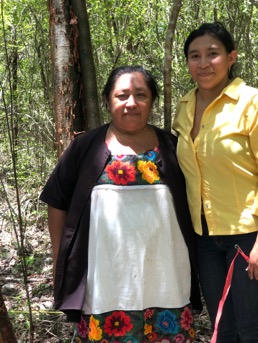
Florencia conducting field work with Maya communities in Southeastern Yucatan in Mexico (photo courtesy of Florencia Pech).
Florencia is trained in the discipline of botany but later became intrigued by plant-people relationships through both academic and personal experiences. Growing up in Mexico her parents kept and used a variety of medicinal plants around the house and frequent visits to her relatives in the Maya community of Temax kept her connected to family in rural areas. During her bachelor’s degree she collaborated in a study on home gardens in the Yucatan peninsula and further built relationships with these communities through participation in a botanical field school in the SE Yucatan. Based on these experiences, Florencia went on to pursue part of her dissertation in the ethnobotany of Mayan communities in the Yucatan Peninsula.
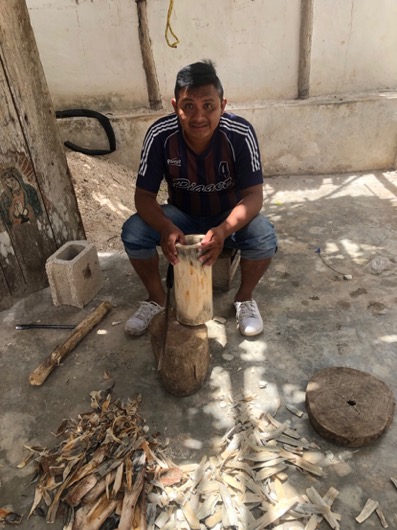
A carver working on a handicraft made from the chaka tree, the focus plant of Florencia’s dissertation research (photo courtesy of Florencia Pech).
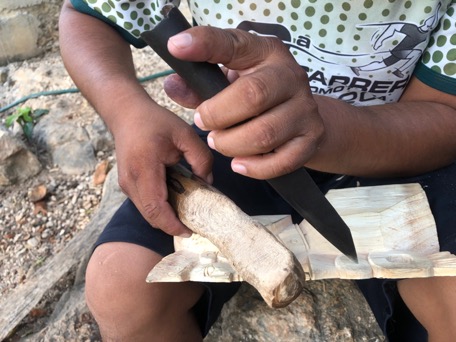
A chaka tree mask in progress (photo courtesy of Florencia Pech).
Florencia’s dissertation research seeks to understand how handicraft production for the Yucatecan tourist market is influencing livelihoods and dry tropical forest management in Maya communities close to the World Heritage Site of Chichen Itza. Although, artisans also use cedro (Cedrela odorata) to carve masks, she is specifically focused on the chaka tree, harvested for wood directly from the forest to carve masks sold to handicraft markets. The mask trade is transforming the ways Mayan people live in the Yucatan as well as influencing the management and structure of dry tropical forests where chaka is found. The majority of research conducted on handicraft production in Yucatan communities has been led by non-Native outsiders; Florencia’s perspective and research on this topic as an insider to Mayan communities in her study area will provide a novel and important insight on this topic.

Some of the tools and chaka wood used to produce the handicraft masks sold at nearby tourist markets (photo courtesy of Florencia Pech).

An array of handicrafts carved from cedro and chaka wood (photo courtesy of Florencia Pech).
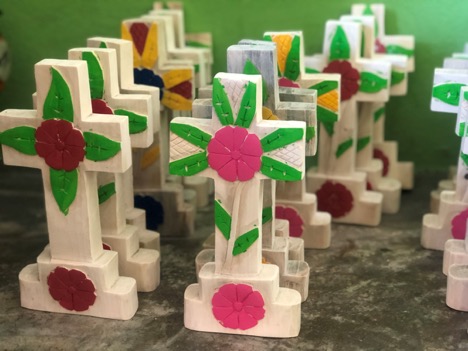
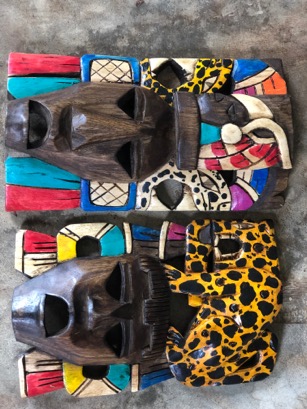
Beautifully painted masks and cruces (above) (photos courtesy of Florencia Pech).
In the future, Florencia plans to return to Mexico following completion of her dissertation to continue work in the Yucatan through a university or research center in Mexico. She hopes to focus on projects related to natural resource management and sustainable development with Mayan communities all around the peninsula. Florencia aspires to help more indigenous women in the Yucatan get involved in education and research in Mexico.
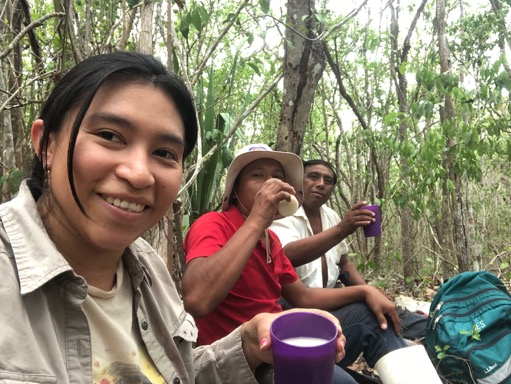
Florencia enjoying her field work during a break while measuring forest plots (photos courtesy of Florencia Pech).
David Colozzais a researcher through the joint Ph.D. program in Geography at King’s College London and the National University of Singapore. David has a mixed background in development economics, Asian studies, and agricultural development, which ultimately led him to the decision to start a PhD in Geography, a field that he finds a great fit because it brings together lots of people with different skills, backgrounds and research interests. His doctoral research focuses on the impact of socio-economic change, and particularly urbanization, in Indonesia on traditional local diets, knowledge, and practices related to food. The support through the Urban Ethnobiology Fellowship has helped David navigate through the logistics of spending several months in Indonesia to conduct field work.
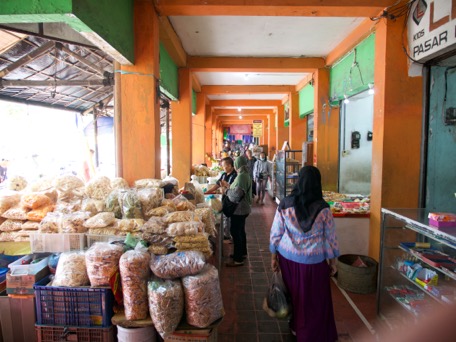
Traditional snacks for sale at the local market (photos courtesy of David Colozza).
David’s research interests encompass two but inter-related research streams: 1) how diet and food practices change over time, in both urban and rural areas, and key drivers of documented changes and 2) human-nature interactions in agriculture production systems with emphasis on the retention of heirloom seed varieties, traditional livestock breeds, and associated indigenous knowledge. His dissertation titled, “Urbanization, dietary change and local food cultures: the case of Indonesia”, looks at how global drivers, and specifically urbanization, have impacted local traditional diets in Indonesia and how traditional practices and knowledge (e.g. home food production and sharing) are retained in cities, despite increased level of socio-economic change.
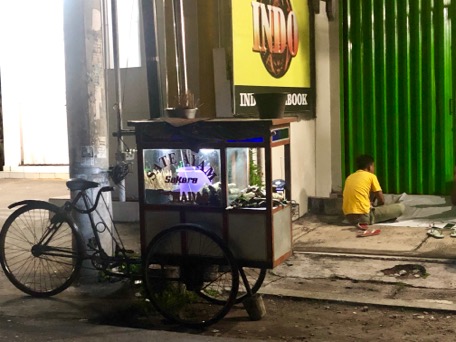
A mobile food seller in Yogyakarta (photos courtesy of David Colozza).
David spent approximately seven months in Yogyakarta, a city located in the Indonesian island of Java, to collect data for his research. A central critique of his research suggests that local food cultures and knowledge are largely disregarded in global dietary change narratives contributing to assumptions that the world is generally moving towards western food systems and diets. By incorporating local cultures and knowledge, David argues that we can paint a more complete picture of what is actually going on in terms of food systems and dietary change and in turn work on developing more effective interventions particularly in terms of health policies.
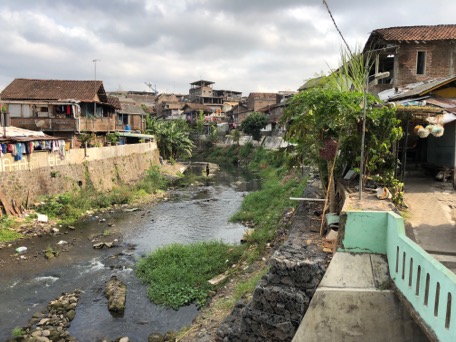
One of David’s research areas in Yogyakarta(photos courtesy of David Colozza).
David conducting interviews with research participants (photos courtesy of David Colozza).
He finds his research in the urban context unique as human-nature interactions are less obvious, and are more likely to be overlooked—but not less present nor important! Many urban communities in Indonesia retain a rural or village like feel. It is not uncommon to find rice paddies in the city or for local residents to have fruit trees and edible plants around their homes for home consumption and to share with neighbor’s, family and friends (and the odd Ph.D. researcher who interviews them!).
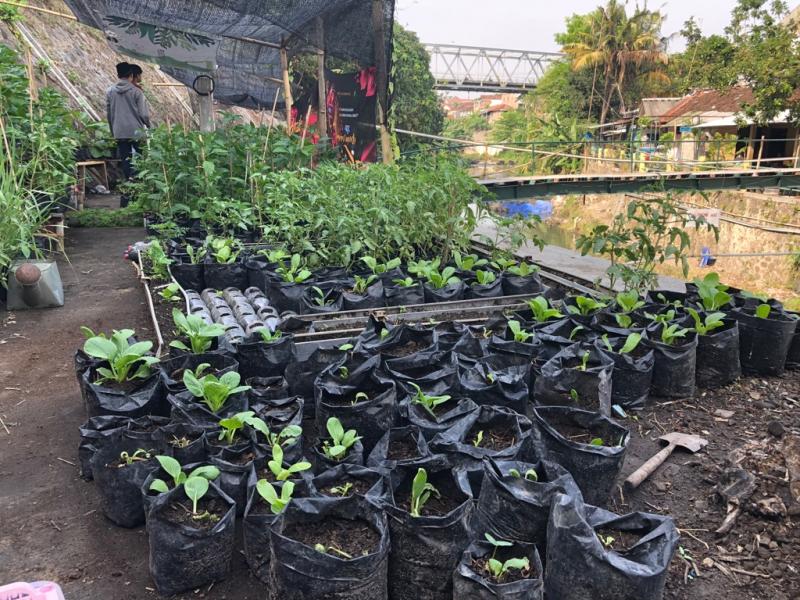
Community food growing in one of his research areas (photos courtesy of David Colozza).
After his Ph.D. David plans to pursue a postdoctoral opportunity that will help him further develop his research in Indonesia and move forward other projects in perhaps other regions and countries.
To learn more about David’s urban ethnobiology research in Indonesia check-out his recently published journal article, titled “Urbanisation, dietary change and traditional practices in Indonesia: a longitudinal analysis.”David would love to connect and exchange with fellow members who share an interest in the themes of agro-biodiversity, food systems and dietary change and beyond.

